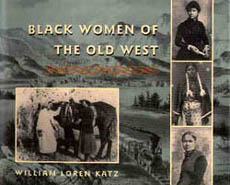Black Women of the Old West
New edition coming out in 2024, from Chicago Review Press:
Black Women of the Old West
African American women appear in few textbooks, Hollywood or TV movies of the West, but they were likely to turn up anywhere in American frontier life. Thousands, welcomed to or born among Native American nations, tried to help stave off the march of white “manifest destiny.”
Many led ordinary, hard working lives in the 19th century, but not all. One drove a stagecoach and delivered the U.S. mail in Cascade, Montana. One, sifting on the back seat of the Marysville-ComptonVille stagecoach, died in a blaze of gunfire during California’s first stagecoach robbery. Another in early Seattle helped her husband run a newspaper. In early Texas, another started an impassioned crusade to elevate women and liberate the workers of the world.
An African American woman owned Beverly Hills, California and another owned huge parcels of Los Angeles real estate. One founded a Black town in Oklahoma, another ran a large carting business in Nevada, and the funeral of another was conducted by the Colorado Pioneers Association and attended by the Governor of Colorado and the Mayor of Denver.
However, their presence was ignored when scholars, textbook writers and movie and TV makers, spun their lily-white frontier tales. Black women rarely appeared even as servants and cooks, maids and nannies.
It has been argued that since African American women were a tiny minority within a western minority, omitting them was hardly an act of discrimination. But though few numbers in the saga of the wilderness they earned an honored niche. As the nation grapples with the current results of its multicultural past, the story of frontier African American women deserves a telling.
Reviews
“Extremely well written, filled with fascinating information and eye-catching photographs, Black Women of the Old West is one of the most interesting books I have ever read.”—Dr. Betty Shabazz, WLIB radio [N.Y.C.]
“This is that perfect find: a book that entertains and enlightens. Mr. Katz’s books on black history are well known to readers young and old. Add this one to the growing list of literary treasures. Browsing through the many pictures is a true delight like meeting distant relatives. A must read.”—Alice O’Neill, Los Angeles Features Syndicate
“Here are fascinating vignettes and photographs of dozens of women, some famous, others unknown outside their own family circles, who lived across the West. . . .”–New York Sunday Times Book Review
“William Loren Katz’s books on black history are well known to readers young and old. Black Women of the Old West is a groundbreaking look at a forgotten population of western settlers — African American women. He traces how these women challenged white bigotry, labored to create new lives, and ultimately helped transform sparse settlements into thriving states.”—National Black Review
“Year after year, author/historian William Loren Katz continues to mine the lodestone of Black culture, and it is simply amazing how often he manages to find new treasures. Here, with the same insight he brought to Black Indians and his other books, the author traces the courageous role of Black women in settling the West. He deftly shows how these pioneering spirits helped stabilize early communities in Texas, Oklahoma, California and elsewhere.”—Herb Boyd, co-editor of “Brotherman”
“Kids ages 10 and up will appreciate a unique focus on black women of the West. Many forged lives as pioneers, ranchers and even store owners: 100 archival photos and old clippings serve as the foundation for an in-depth probe of how these pioneering women helped settle the country.”–Midwest Book Review
“Black Women of the Old West, a coffee-table size book with more than a hundred pictures, unfurls the saga of African American women who rode the wilderness trails throughout the old West and turned up on every frontier.The books of William Loren Katz will interest and excite your children and offer important history they won’ learn about in school.”—Black Child Magazine
